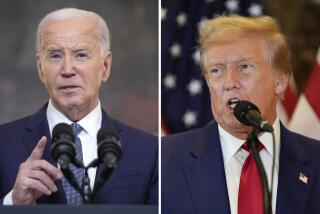PERSPECTIVE ON BOSNIA : A Deal With the Devil Won’t Stick : Milosevic signed with blood on his hands; if he gets amnesty, how can his henchmen, already indicted, be prosecuted?
The peace agreement for Bosnia bars people under indictment for war crimes from holding office in the new Bosnian state. But the biggest war criminal of them all is not an official of Bosnia; it’s Serbian President Slobodan Milosevic, who apparently will get off scot-free. This is not only a travesty; it’s a dire omen for the long-term peace of the Balkans and beyond.
Almost three years ago, then-Secretary of State Lawrence Eagleburger put Milosevic at the top of the list of those the U.S. government believed should be tried by a “second Nuremberg” tribunal. Subsequently, the United Nations created a war crimes tribunal for the former Yugoslavia, which has already brought indictments against at least 50 individuals. Milosevic is still under investigation, but strong evidence exists that those already indicted were taking their orders, directly or indirectly, from him.
Milan Martic, the “president” of the defunct Republic of Serbian Krajina (in Croatia), has been indicted by the tribunal. In a recent interview with the Belgrade newspaper, Telegraf, Martic said, “No one in Krajina undertook any moves, even of the smallest nature, without informing or consulting Milosevic.” Earlier this year, after the Croatian Serbs suffered their first military reversal, their military commander was replaced by the assistant chief of staff of the Yugoslav army in Belgrade. Milosevic, not Martic, ordered this.
Milosevic had also appointed the first commander of the Croatian Serb forces, Gen. Ratko Mladic. When the Serbs completed occupation of 30% of Croatia in 1991, Milosevic made him the commander of the Bosnian Serb forces in time to launch the war in Bosnia in 1992. Mladic was indicted by the U.N. tribunal this past July, and the indictments have since been expanded to include his command of the Serbian forces that overran Srebrenica and murdered 5,000 to 10,000 prisoners of war there in cold blood.
As accounts of the massacres have mounted, so have stories about the role of Serbian authorities. Killing fields have been found at half a dozen locations, some far from any fighting, meaning that this was not some rogue action but a well-orchestrated campaign. U.N. officials on the scene were quoted attributing responsibility for this campaign to Milosevic. Western government intercepts were reported to show that Mladic, while commanding the operation, was in constant radio contact with the chief of staff of the Yugoslav army, Momcilo Perisic.
Among those said to have carried out the massacres in Srebrenica and also in northern Bosnia this fall were the irregular forces commanded by Zeljko Raznjatovic, or “Arkan,” the most notorious of the ethnic cleansers. Although he has committed atrocities in both Bosnia and Croatia, he is native to neither. He lives in Serbia proper, where he is a member of the Serbian Parliament closely tied to Milosevic. According to a variety of authorities, including the former staff secretary to the Serbian defense minister, Arkan’s militia has been bankrolled by Milosevic’s government, and Western intelligence sources say that Arkan has long been employed by the Serbian secret police.
In spite of this and much more evidence of Milosevic’s criminality, the Clinton Administration chose to make Milosevic its peace partner. Although the Dayton agreements nominally reaffirm the mission of the tribunal, that body will now come under enormous pressure to grant Milosevic a tacit amnesty. If it does, the indictments against the others will lose all credibility.
The Nuremberg tribunal rejected the claims by Nazi defendants that they were only following orders. But if Hitler had negotiated a settlement to end the war, clinched by treaties and handshakes and immunity for the Fuhrer, it is hard to see how the prosecution of his underlings could have gone forward.
Bosnian President Alija Izetbegovic said at the signing in Dayton: “This may not be a just peace, but it is more just than a continuation of war.” But a peace that is not just may also not be durable. Letting the butchers of Srebrenica or those to whom they reported off the hook will assure that the worst elements will rule “greater Serbia,” even if a couple of individuals are barred from office. It will also ensure that the thirst for revenge will long burn in Muslim throats.
Moreover, part of the stake in Bosnia is the example being set for the other volatile formerly communist lands. The carving up of Bosnia will ratify the results of Serbian aggression. And treating Milosevic as a peacemaker makes a mockery of the international community’s pious pronouncements against war crimes. The U.N. tribunal on Bosnia is the first such since World War II. In the interval, applicable international humanitarian law had been strengthened by the adoption of the Geneva Conventions of 1949 and the Genocide Convention. But exonerating the chief Yugoslav culprit will strike a fatal blow to this law.
There is an unwritten codicil to the Dayton agreements. It says: Aggression pays and crimes against humanity will be held against you only if you lose.
More to Read
Sign up for Essential California
The most important California stories and recommendations in your inbox every morning.
You may occasionally receive promotional content from the Los Angeles Times.










